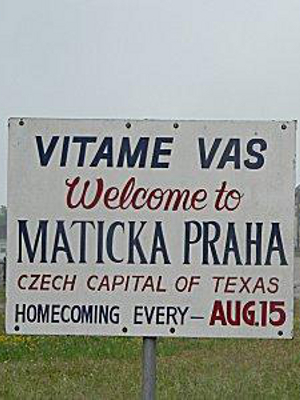While attending an American boarding school three years ago, 20 year-old Czech university student Krystyna Čermáková was confronted with American perceptions of the Czech Republic for the first time. Some of her classmates didn’t know where the Czech Republic was, others called it “Czechoslovakia,” and most summed it up as a land of “great beer”, “great hockey players”, and “Václav Havel.”
The Czech Republic’s history is complicated. Over the course last 100 years or so, the country has had to endure six name changes and many rulers. This led to the creation of the country’s “defensive” posture, as noted by prominent journalist Czech dissident Jan Urban, wherein Czechs are suspicious of leaders and authority in general.
73 year-old Peter Formánek, president of the Canadian Chamber of Commerce in Prague, feels that the Czech people are too quick to forget the past, particularly those who continue supporting and “trusting” a modern communist party simply because its members promise to “do better” than their predecessors. Formánek immigrated to Canada in 1968 after his involvement in a demonstration against the government made him a target. He spent over forty years abroad raising a family, and returned to the Czech Republic twelve years ago at the behest of his Canadian wife. He believes the Czechs are “survivors,” and that after so many years of oppression and a history of constant regime change, Czechs have emerged with an “adjustable” demeanor.
Formánek believes that anyone who understands the “Czech soul” may identify as a Czech. He believes that his wife, Suzanne, has tapped into that soul through her appreciation for the “inventive” and artistic nature of the people. Despite her Anglo-Saxon roots, Formánek notes that she identifies well with the “softer, more poetic” dimensions of Czech culture.
Like Formánek, Mariana Trojánová, a 24 year-old Czech student, is also open to accepting those who are not ethnically Czech into the clan, defining Czech identity as a “feeling” and a choice. Her sentiments were echoed almost verbatim by Čermáková, who also feels that continuity is important, stating that “small Czech aspects of childhood,” particularly stories and songs are often passed on from parent to child.
On the other hand, Urban emphasizes civic responsibility stating that “to be a Czech is not a condition, but a task,” and notes that the Czech Republic is in some ways following the American model of cultural “emphasis on [the] citizen.” Urban notes that “being Czechoslovak was the only identity I really wished for and acknowledged.” His grandfather told him to “never say you’re Czech in the Czech lands,” because so many different peoples have inhabited the area over the centuries. Only Urban described the Czech Republic as a “melting pot.”
39 year-old anthropologist, Yasar Abu Ghosh, who was not born in the Czech Republic, identified himself as both Palestinian and Czech. “It’s not a smooth thing to have two identities, but I can.” As a child in Czechoslovakia, Ghosh was often confused as a Romani (gypsy) due to his complexion. He remembers not fully understanding “what Roma represented” to the Czech people. Though he detected a negative connotation, it caused him to identity more heavily as an Arab. “Arab meant not gypsy” notes Ghosh, however, Czechs stopped confusing him with Roma people when he “started wearing glasses.” Perhaps because glasses stereotypically make people look smarter and this somehow disqualified him as a Roma person.
Adam Rosenberg, a 21 year-old Slovak student studying in Prague stated that he identifies with Czechs, but feels that as a Slovak, he could never become Czech (the two countries split in 1993 – Ed.). He noted cultural differences, referencing a propensity for historically-based humor among Czechs and a greater tendency toward rambunctiousness among Slovaks, but like Urban, Rosenberg believes in a common Czechoslovak identity.
For Čermakova, “knowing the language is the first step to [knowing] the culture.” Since “a lot of the jokes are connected to history or cultural things” and since traditional songs are sung in Czech, lack of access to the language would mean a lack of access to some customs. Gosh also feels that Czech language is essential to Czech identity, since it “instills you with some familiarity” with the culture and people.
Perhaps it is Rosenberg, the Slovak, who summed it up best. He feels that nothing is as quintessentially Czech as the famous tongue-in-cheek theatrical character of Jára Cimrman, a fictive Czech scholar and adventurer known for his seemingly superhuman aptitude for accomplishing everything. Cimrman, along with the Czech literary character the Good Soldier Švejk, are beloved figures in Czech society. The Good Soldier could be interpreted as an apparent buffoon or subtle genius, whose incompetence showcases the absurdity of the first World War and his Austro-Hungarian commanders. What Sherlock Holmes means to the British, Cimrman and the Good Soldier Švejk mean to the Czechs. Cimrman and Švejk embody multiple cultural motifs and are consequently embraced by the Czech people as national heroes. Čermakova described the Cimrman theater performances as the “one thing that cannot be translated from Czech.” Everything from the humor to the underlining themes of the plays and the jokes personify the Czech history and heritage. Attending a performance at the Jára Cimrman theater in Prague is perhaps the perfect litmus test for discerning who is Czech because, as Čermakova says “if you don’t understand Cimrman, then you do not understand the Czech people.”
published: 3. 2. 2013







